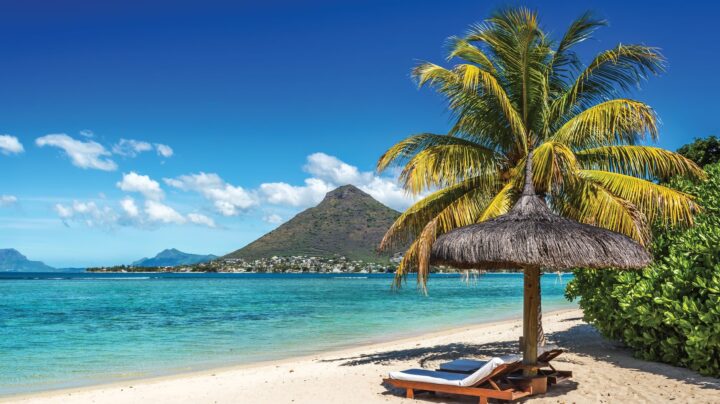
Best Time to Visit Mauritius
The best travel time for Mauritius: when is the ideal holiday weather? / Best Time to Visit Mauritius
Mauritius is a real holiday paradise – but you can only really enjoy your trip when the weather is good. Here you can find out when is the best time to start!
Are you in the mood for a dream vacation? Then the paradisiacal island state of Mauritius with its endless white sandy beaches, azure blue sea and impressive volcanic landscapes in the southern Indian Ocean is ideal. You can find out in our article when you can fully enjoy your holiday there in terms of the weather.
Summer, sun, southeast pass
As already mentioned, Mauritius is located in the southern Indian Ocean, which has two consequences: On the one hand, its location in the southern hemisphere means that the seasons here are the opposite of those in Germany: while the months of May to October are here on are the warmest, they are the colder half of the year in Mauritius, i.e. the winter there. However, the second consequence of the island’s position is that Mauritius, like all other islands in the region, is influenced by the trade winds – Mauritius is affected by the south-east trade winds all year round, which compensates for high temperatures and high humidity all year round. In other words, although there are actually two seasons in Mauritius, southern summer between November and April and southern winter between May and October, the weather is summery all year round with beach temperatures averaging between 25 and 30 degrees Celsius. Or to put it another way: In principle, Mauritius is ideal for a holiday all year round.
If you not only fly at the right time, but also book at the right time, you benefit twice over.
A destination for the whole year?
As mentioned, you can enjoy wonderful holidays in Mauritius all year round; Nevertheless, there are months when a trip to the island is a little more attractive than others – and which months are depends not least on what you would like to do. We have therefore divided the year into sections below and tell you which activities are particularly suitable for the respective travel time and what speaks for or against a trip in these months.
Mauritius in January and February / Best Time to Visit Mauritius
Let’s start at the beginning of the year and with it the only time in Mauritius that we wouldn’t necessarily recommend for a holiday – why? Because the risk of cyclones is particularly high in January and February.
Cyclones are hurricanes that form when the surface (up to a depth of 50 meters) of the sea heats up too much and then so-called cloud columns form. These pillars of cloud are set in motion by the rotation of the earth and then cause strong storms that sometimes penetrate to the mainland of Mauritius. Cyclones therefore occur particularly frequently in the southern summer, when the sun shines vertically on the sea for a particularly long and intense period of time and the water temperatures are correspondingly high. Although it is not the case that Mauritius is really hit by cyclones every beginning of the year (this only happens once every five years on average), those who want to be on the safe side should avoid these months – even though that is when the island is in high season.
Mauritius in March and April
March and April, like the entire southern summer, are the main season in Mauritius, which is mainly due to the fact that during this time of year many travelers from Europe want to escape the cold weather to the south. The prices are correspondingly high and the beaches are a little busier than in other months. The rainy season also prevails in Mauritius between November and April – up to a third of all days there is precipitation. Although these are usually rather short, they can sometimes be quite violent.
The weather in general, on the other hand, is still midsummer, which brings with it further advantages and disadvantages: On the one hand, there is perfect beach and bathing weather in March and April. Air temperatures are still hovering around 30 degrees Celsius and the sea is only 2 to 3 degrees cooler. If you like lying on the beach all day and dreaming in the sun or diving into the waves to splash around or take trips under the water surface, this is the place for you. By the way, on the beach you don’t feel the high humidity (up to 70% and more) that much.
It is also this humidity that makes trips to the mountainous interior of Mauritius in March and April not quite as ideal. Although it is on average 4 to 5 degrees cooler here than on the coast, the humidity often rises to 90% and more , which can be very difficult for us Europeans in particular.
Mauritius in May / Best Time to Visit Mauritius
May is generally considered to be one of the best months to visit Mauritius: the weather is still warm, with air and water temperatures in excess of 25 degrees Celsius, but not quite as oppressive as in mid-southern summer. The rainy season is then already over and it only rains on an average of 5 days a month, and thanks to the start of the off-season, the prices are also lower than in April.
On the other hand, there can often be violent storms in May – ideal for all windsurfers, less ideal if you want to spend a quiet day at the beach. In return, there are now more trips inland and even under the water surface it is still fantastically beautiful.
Mauritius June to September
June to September are the coolest months in Mauritius, but also the driest. First of all: When we say cool, we mean anything but cold: The temperatures, especially on the coast, still climb to over 25 degrees Celsius almost every day and the water is just a little small at an average of 24 to 25 degrees Celsius little more refreshing than in southern midsummer. You hardly have to fear rain: rain clouds can be seen on an average of just two to four days per month.
June to September is also the best time of year to explore the interior of Mauritius: the wonderful volcanic mountains are definitely worth a visit and the humidity is now in the tolerable range even at higher altitudes. But be careful: the air temperature inland can sometimes drop to just under 20 degrees between June and September, so take appropriate clothing with you.
By the way, you don’t have to reckon with cyclones during this time of year: These can never occur due to the lower temperatures. And there is another big advantage of southern winter trips to Mauritius: The prices are then the cheapest and you can get some great flight and hotel bargains.
Mauritius in October / Best Time to Visit Mauritius
As the southern winter draws to a close, temperatures slowly begin to rise again. In October, similar to May, it can sometimes be over 30 degrees in the air and over 25 degrees in the water and yet it is still the low season, which keeps prices pleasantly low. So if you want to counteract the onset of winter in Germany with a little sun and dream beaches in the southern Indian Ocean, October is the perfect time to do so.
Mauritius in November and December
From November, the southern summer will spread again in Mauritius. The temperatures climb back to an average of around 30 degrees Celsius and the water is a comfortable 26 to 27 degrees. Cyclones usually do not occur until mid-December at the earliest and precipitation is also very limited with a maximum of five rainy days per month.
The downside: the island is very busy in December and the prices are significantly higher again. Especially over Christmas and New Year’s Eve, sunny Mauritius is simply much nicer than cold, wet Europe…
A few more general tips
Now that you know the pros and cons of the travel year on Mauritius, we would like to give you a few general tips for your holiday on the dreamlike island – to be on the safe side.
Weatherproof vest
When it comes to a holiday in Mauritius, the east coast is not the same as the west coast. Due to the high mountains in the center of the island and the constant influence of the south-east trade winds, the north-west of the country in particular is largely spared from strong weather influences, which can be clearly felt in the south-east: strong winds in the south of summer hit the south-east coast in particular (which is sometimes a problem for surfers). is ideal!), while the west, on the other hand, gets a little bit more precipitation.
Peak season in the rainy season
We have already mentioned it above, but we would like to say it again clearly: The main season in Mauritius, from November to April, goes hand in hand with the rainy season there. This means that you have the highest temperatures in southern summer, but at the same time you have to reckon with far more precipitation and higher humidity. If a few degrees less don’t bother you (or even make you happy), you’d be better advised to travel during the southern winter months, i.e. from May to October.
Don’t be afraid of cyclones / Best Time to Visit Mauritius
Right at the beginning of our list of travel months, we warn you against a vacation in January and February – here we would like to put the whole thing into perspective. It is true that cyclones can occur during the southern summer in Mauritius, and here specifically in January and February; In most cases, however, these do not reach the mainland and are primarily noticeable as stronger waves, especially on the south-east coast. Windsurfers might even find these events particularly appealing, and those who really want to go to Mauritius at the beginning of the year but want to take a little precaution can simply travel to the better-protected north-west side of the island.
You would like to escape the cold in the German winter, but you don’t really like the high probability of rain during the southern summer in Mauritius? Then consider flying to Vietnam instead.
Similar to Mauritius, wonderful beaches and stretches of coast, fascinating mountain landscapes in northern Vietnam and warm weather all year round await you here – between December and March, however, with very little rainfall.
Best time to visit India
Best time to go to Zanzibar
The top 15 sights and activities in Mauritius / Travel Guide
Discover Mauritius! / Mauritius Travel Guide
Categories: General
